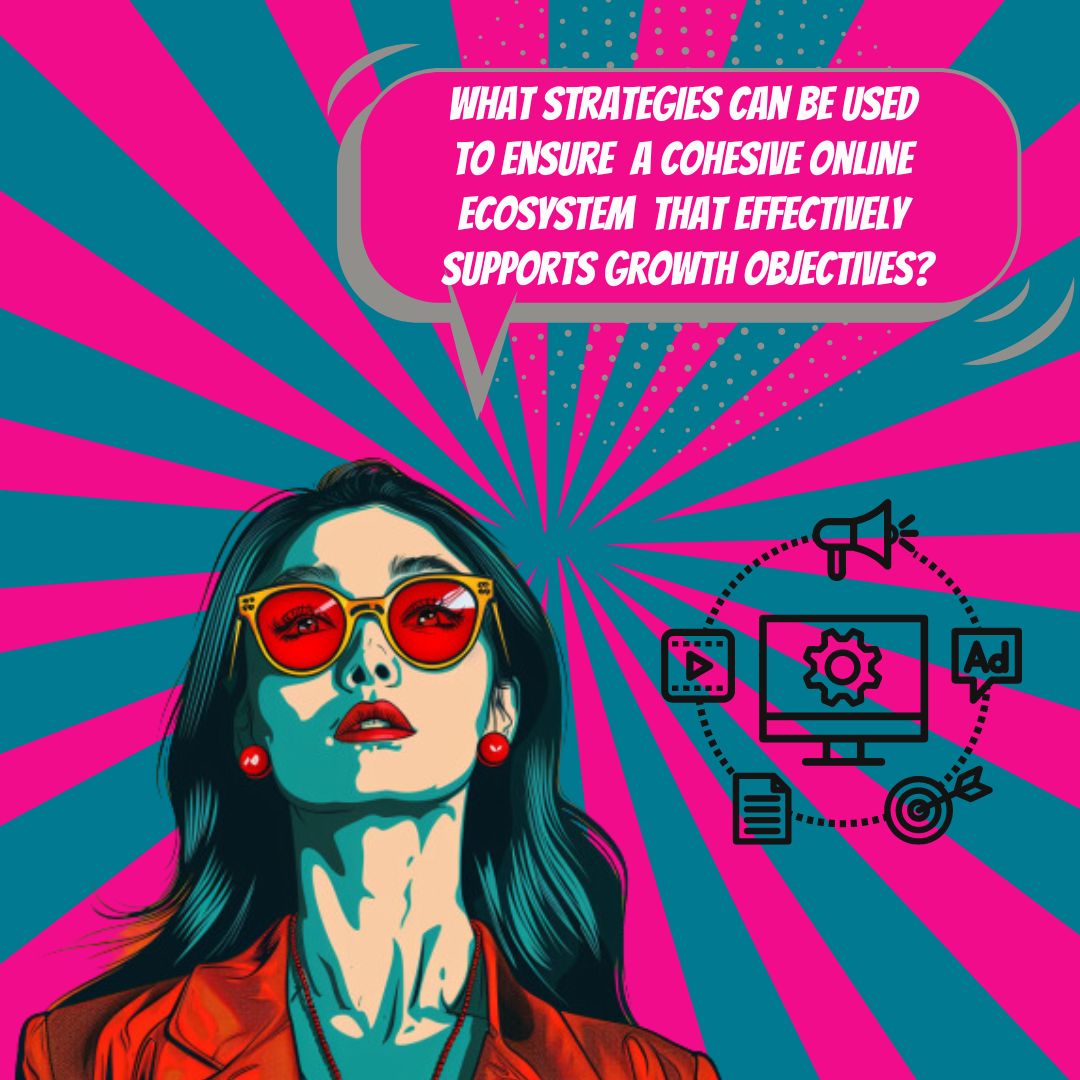Key Takeaways
✅ Ecosystem Strategies Can Generate Significant Value: Exploring the full potential of digital ecosystems could majorly boost business revenues by expanding networks and bringing new products to market. This surge can increase the global economy share from a mere 1 to 2 percent to around 30 percent by 2025.
✅ Core Capabilities for Success: key capabilities like advanced analytics and agile operations are non-negotiable for businesses aiming to create value in a digital ecosystem, enabling them to innovate and streamline for efficiency and growth.
✅ Benefits of Digital Ecosystems: Embracing digital ecosystems isn't just trendy – it's profitable. Through partnerships and shared resources, companies experience reductions in operational costs and enjoy revenue streams that outpace industry averages by 27% to 32%, with projections hitting $50 trillion in sales by 2025.

Introduction
Are you ready to unlock a world where your business not only survives but thrives online? In a digital age where the market is inundated with competition, standing out is mandatory for growth. But how can you turn your standard online presence into a powerhouse digital ecosystem?
Digital ecosystems are more than a buzzword—they are the key to unlocking unprecedented growth and scalability in the modern world. The process of orchestrating an interconnected online ecosystem can be the difference between staggering in the shadows of digital obscurity and shining in the marketplace limelight.
By diving into this article, you'll explore innovative perspectives on building an interconnected online ecosystem that propels you to the forefront of your industry. You'll discover modern trends and solutions that maximize revenue, optimize ROAS, and boost your overall ROI. Get ready to unearth actionable insights and groundbreaking information that will reshape the way you envision and execute your digital strategy.

Top Statistics
| Statistic | Insight |
|---|---|
| Digital Transformation Market Growth: Expected to grow at a CAGR of 23.1% from 2022 to 2030, reaching $3,810 billion. | This rate of growth demonstrates the vast potential for companies who are ready to invest and innovate in the digital arena. |
| Employee Digital Skills Gap: 69% of employees lack access to enough technology to make their work easier. | Businesses must prioritize employee training and technology accessibility to enhance productivity and job satisfaction. |
| Digital Ecosystems in Financial Services: Chatbots expected to save banks $7.3 million on annual customer service budgets by 2023. | Automating customer service not only reduces costs but also improves satisfaction by providing quick and convenient assistance. |
Understanding Digital Ecosystems: The Key to Success
Think of digital ecosystems as a bustling city where everyone and everything is connected. In this city, the roads are data pathways, the buildings are platforms, and the citizens are users and businesses. Companies must navigate this city wisely, realizing it's not just about setting up shop; it's about creating relationships and making sure your digital service or product interacts smoothly with others. Consider how smartphones tie into apps, accessories, and other services — that's a snapshot of a digital ecosystem. To truly thrive, companies need to appreciate this interconnectedness and use it to fuel innovation and growth.

The Five Factors of a Succesful Digital Ecosystem
Starting quickly can give you a leg up, but it's not a silver bullet. The Boston Consulting Group underlines that in addition to speed, you'll need a solid game plan and something valuable to offer. A strong user base will naturally attract skilled partners and much-needed funds. Moreover, don’t skimp on the allies; a lineup of partners from various fields can inject diverse talents and fresh ideas. The notion of competing on the rate of learning is crucial—a business must adapt and evolve swiftly. Lastly, strategic thinking is what ties all of this together, kind of like the coach of a sports team, mapping out plays that will lead to wins in the digital realm.
Lessons from Ecosystem 1.0: Climbing to the Next Level
Looking at what the first wave of digital ecosystem strategies accomplished, it turns out that many were a bit more miss than hit when it came to financial success. McKinsey recommends doubling down and going deep into the digital trenches if you want to come out on top. Also, a heads-up to companies: be strategic, and don't just dip your toes in the water with easy-to-implement tactics or partnerships just because they're convenient. Doing so could mean you're heading towards a dead end rather than the digital promise land.
Redefining Experiences Across Industries
From energy sectors to online gaming, digital ecosystems are reshaping how we experience services and products. In insurance, they're making it easier for customers and brokers to talk directly, removing the annoying middle steps that can slow things down. For the gaming world, it's all about uniting gamers across different platforms for a shared experience. This isn't just about being cool or trendy: these ecosystems can bring a unique edge that can help a business stand out in a crowded market.

Building a Clear Digital Ecosystem
When you're building a digital ecosystem, it's a bit like piecing together a complex puzzle. You've got to choose the right tech pieces—things like Internet of Things (IoT) and Software as a Service (SaaS)—that will work well together and provide smooth automated processes, sharper data analysis, and frictionless connections within the network. And here's the kicker: businesses will need to back off a bit on the control, opting for a more open-handed, decentralized approach that lets partners have some skin in the game too.
The Future of Digital Ecosystems
Digital ecosystems aren't static; they're more like living, breathing organisms that keep evolving. And they're starting to blur the lines between the online world and the physical one. There's going to be a bigger, more complex web of devices to tap into for data and insights, and companies that can harness this web effectively have the potential to hit it big. Staying on top of the trends and leveraging these digital ecosystems effectively could well be the deciding factor between a company's boom or bust in the future.
AI Marketing Engineers Recommendation
Recommendation 1: Leverage Data-Driven Personalization: Invest in CRM and analytics tools that track customer behavior and preferences. Companies using advanced personalization report a sales boost of up to 15% and a marketing spending efficiency increase by up to 30%, according to McKinsey & Company. Tailor your online interactions and content to individual customer preferences, thereby fostering an online ecosystem that not only attracts new customers but also enhances loyalty among existing ones.

Recommendation 2: Integrate Seamless Omnichannel Experiences: Create a unified experience across all digital platforms – from social media to mobile apps to virtual assistants. Harvard Business Review found that 73% of shoppers use multiple channels during their shopping journey. Synchronize your online messaging, branding, and transaction capabilities, ensuring customers receive consistent experiences whether they're interacting with your brand on their laptop or smartphone. This connectivity helps to build a robust online ecosystem that supports customer retention and acquisition.
Recommendation 3: Implement AI-Powered Analytics for Real-Time Insights: Embrace Artificial Intelligence (AI) tools that provide immediate consumer and performance data.
Platforms like Google Analytics, SEMrush, and Moz can track your ecosystem's health, inform on user engagement, and suggest optimizations. AI tools can help detect patterns to predict future consumer behavior, allowing for proactive rather than reactive marketing strategies. This implementation could mean the difference between staying ahead of market trends or perpetually playing catch up.
Relevant Links
- Master WeChat: Your Passport to Digital Success in China
- Conquer China's Short-Video Scene: Douyin & Kuaishou
- Digital Marketing Mastery: Navigating China's Regulatory Landscape
- Unlocking the Power of Baidu SEO in China
- The Hottest Video Marketing Trends from South Korea
Conclusion
In wrapping up this insightful journey through the dynamic realm of digital ecosystems, there's a strong takeaway for businesses aiming to anchor their presence in the future's digital tapestry. Understanding and mastering the interplay within these interconnected networks isn't a mere luxury; it's an essential stride towards ensuring sustainable growth and relevance in a market that's becoming increasingly sophisticated.
The road to nurturing a thriving digital ecosystem is paved with strategic thinking, deep investments, and a relentless focus on learning. But it's not just about setting the wheels in motion; it’s also about continuously pushing the boundaries of innovation and user engagement. The five factors outlined by Boston Consulting Mall point towards critical areas where businesses must excel: beyond being an early mover, cultivating a solid user base, building a diversified partnership bench, learning at an accelerated pace, and, above all, thinking strategically.
We've learned from previous attempts in Ecosystem 1.0 that depth and strategy trump convenience and the temptation to tiptoe through digital transformations. As industries like insurance and gaming exemplify, the real game-changer is in redefining user experiences that deliver not just products but moments of delight and seamless daily engagement.
Moving forward, staying ahead means choosing the right technological platforms, breaking away from tight control towards more collaborative dynamics, and keeping an eye on data as the golden thread that binds these ecosystems. As digital ecosystems continue to intertwine with our physical reality, the future beckons businesses to be as adaptable and interconnected as the technologies they employ. Embrace this digital evolution with an open mind and a strategic plan, and watch as your business unlocks new horizons of digital success.

FAQs
Question 1: What is Digital Marketing?
Answer: Oh, digital marketing is pretty much like setting up a digital lemonade stand, but instead of lemonade, you're offering a whole array of services and products over the internet. It's quite the trend and a pretty rewarding career path too!
Question 2: Why has Digital Marketing grown compared to offline marketing?
Answer: You know, digital marketing has really taken off because it lets you chat with folks from all corners of the planet, keep tabs on how well your ads are doing, and doesn’t burn a hole in your pocket the way billboard or TV ads can.
Question 3: What are the top 3 digital marketing skills that employers are looking for?
Answer: Companies are searching high and low for people who can decode data analytics, whip up some great content, and who know their way around SEO like the back of their hand.
Question 4: How do you measure the social media marketing success of an organization?
Answer: It's actually a bit like fishing – you toss your line with engaging content, and then you wait to see the catch – stuff like how many people are downloading your content or buying things online.
Question 5: What are some popular digital marketing tools?
Answer: There's a tool for just about everything! Like Google Analytics, Ahrefs and SEMrush for digging into data, or Hootsuite to keep all your social media ducks in a row.
Question 6: How do you perform A/B testing on your ads?
Answer: Easy-peasy! Just whip up a couple of versions of your ad, send them out into the world, and see which one brings people to your store, virtual or not.
Question 7: How can I stay up-to-date on the latest digital marketing trends?
Answer: Keep your eyes peeled and your ears open! Join some classes, stalk the news, hop onto webinars, and bury your nose in courses online.
Question 8: How do I prepare for a digital marketing interview?
Answer: Do your homework on the company and job, revise those digital marketing textbooks, show off your skills, and practice tackling problems. And hey, don't forget to breathe!
Question 9: What are some common digital marketing mistakes?
Answer: Sometimes, people just don't pay enough attention to who they're selling to, forget that almost everyone's got a smartphone now, don't stick to SEO rules, or change their brand look as often as you change socks.
Question 10: How can you make content go viral?
Answer: Create something that'll make people stop scrolling, something they’ll want to shout about from the rooftops. Make it relatable, make it sharable, and hit the emotional jackpot!
Question 11: How do you respond to negative comments?
Answer: With a cool head and an open heart. Say sorry, see things from their point of view, offer to chat offline, and log what happened for next time.
Question 12: What are the most effective ways to increase traffic to your website?
Answer: Get your SEO game on point, create killer content, wave your social media flag, and aim your ads like a sniper.

Academic References
- Boston Consulting Group. (2019). What Does a Successful Digital Ecosystem Look Like. In this insightful study, the Boston Consulting Group delineates five cornerstone success factors for digital ecosystems, which include the necessity for a fast launch, expansive global reach, and robust collaborative capabilities. The report accentuates the strategic importance of scalability and flexibility, as well as the need to establish a significant geographic presence.
- Gawer, A. (2021). Digital Platforms and Ecosystems: Remarks on the Dominant Organisational Forms of the Digital Age. Gawer's trenchant essay delves into the emergence of digital platforms and ecosystems as the preeminent organizational structures within the contemporary digital epoch. It scrutinizes how these platforms foster value generation and capture, leveraging the interconnected triumvirate of data, software, and networks. Furthermore, the essay calls for an intensified focus on investigating how ecosystems are governed and the overarching impact digital platforms exert on facets including competition, innovation, and job markets.
- Every Learner Everywhere. (2024). Developing a Digital Learning Ecosystem to Ensure Student Success. The workshop by Every Learner Everywhere zeroes in on the establishment of a digital learning ecosystem designed to cultivate student success. It underscores the imperative of crafting an educational framework that is as inclusive as it is accessible, delineating approaches to effectively appraise and financially underpin nurturing, care-centric academic initiatives, foster environments conducive to learning for all, and implement institutional strategies with equity at their core for online educational experiences.
- IMD. Everything You Need to Know About Digital Ecosystems. This comprehensive piece from IMD functions as an introductory guide to the architecture of digital ecosystems, elucidating their operational dynamics, user demographics, and fundamental technical elements. It sheds light on the pivotal roles that centralized databases, Software as a Service (SaaS), Application Programming Interfaces (APIs), and platforms play in the weaving of an interconnected digital ecosystem.
- Koch, F., Benlian, A., Hess, T., & Richter, A. (2022). A Matter of Definition: Criteria for Digital Ecosystems. This scholarly article by Koch and colleagues critiques the defining elements of digital ecosystems, emphasizing the significance of networking effects as drivers of ecosystem success. It furnishes readers with a thorough assessment of the breadth of literature pertaining to the digital ecosystem discourses encompassing the platform economy, the emergence of trust-free systems, and the burgeoning domain of software ecosystems.







